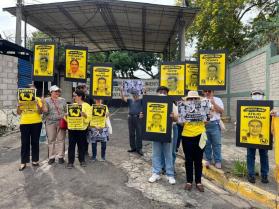Sunday's Election Was Neither Free nor Fair
On Sunday, February 4, Salvadorans went to the polls - in El Salvador and, for the first time, at voting centers around the world - to elect the president and deputies to the Legislative Assembly. According to our observers, in El Salvador, at least, voting day was relatively calm. Things started to change, however, that evening when it came time for thousands of voting tables across the country to open up the ballot boxes, count the votes by hand, and submit their results to the Supreme Electoral Tribunal (TSE). Many tables experienced serious delays in receiving the required paperwork to complete (actas), and, even after, confronted a near-total technological collapse that prevented legislative ballots from being submitted. And yet, just a few minutes before 8 pm, Bukele had declared himself the victor based on "our numbers," claiming 85% of the vote and declaring that his party had won "at least 58 out of 60 deputies," though the electoral authority had not released preliminary results. The message to the Salvadoran people - and the world? The ballots are irrelevant.
In the end, only 70% of voting tables were able to submit presidential results; and no tables were successfully able to submit legislative results. As a result, the TSE announced they would do a recount of 30% of the presidential ballots and 100% of the legislative ballots, which is set to begin on Wednesday, February 7.
However, confidence in the process has been shattered, including due to questions about whether the TSE was able to effectively secure the ballots for the largest department of San Salvador in the interim and whether the recount results can be trusted. Due to lack of reliable information, it is also unclear how many people participated in the elections, both in El Salvador and internationally.
By Monday night, feminist leaders were out in the streets holding a cacerolazo to call out fraud in the elections, holding signs like "TSE: Where are the votes?" and "Proclaiming yourself president and filling the legislature with puppet is not democracy! We don't believe your numbers!"
Members of the leftist FMLN party also denounced the process and lamented the "significant" rollbacks to the electoral system that were evidenced on Sunday. According to Anabel Belloso, FMLN deputy, "This 2024 electoral process has been full of illegalities and irregularities, which [Sunday] made all the more evident. We have been questioning these actions before the electoral authority, which has ignored so much abuse and has clearly made decisions to tip the scales in favor of [the New Ideas party]. All throughout Sunday, the [electoral] process was marked by bullying by New Ideas in every voting center, overseen with complicity by the temporary officials of the TSE as well as other institutions that should play a role in guaranteeing this process, such as the Attorney General's office, which, in some centers, took the side of decisions that were outside of the law. That's why we express our rejection of what happened yesterday and our distrust especially in the closing process, in the preliminary vote count, the lack of transmission and broadcasting of the results."
Based on our observations in El Salvador and at voting centers in various cities in the U.S., CISPES released the following statement to Salvadoran press:
As a US-based organization, the Committee in Solidarity with the People of El Salvador (CISPES) has observed every presidential election in El Salvador since the signing of the Peace Accords in 1992. On Sunday, our accredited international elections observers were present at all moments of the process in voting centers across the San Salvador Metropolitan Area as well as in centers for electronic voting in the United States.
In light of the national context and the reports of our observer teams demonstrating the failure of the Supreme Electoral Tribunal (TSE) to provide the means for accurately recording and transmitting trustworthy vote counts, alongside the decision announced by the TSE to perform a recount of all legislative ballots and 30% of presidential ballots, we express the following: the presidential and legislative elections in El Salvador did not and do not conform to international standards for free and fair elections.
• First: We maintain that free and fair elections are not possible under the extraordinary circumstances of the state of exception, with basic rights such as freedom of association and due process suspended for nearly two years. The government has subjected the population to widespread militarization of communities and, simultaneously, to a manipulative fear campaign intended to convince voters that their safety and well-being depends on the president remaining in power beyond his constitutional mandate.
• Second: The collusion of public institutions - the Supreme Court’s Constitutional Chamber, the Legislative Assembly, and the Supreme Electoral Tribunal - to permit Nayib Bukele to seek a second presidential term in violation of the Salvadoran Constitution of the Republic shattered any confidence that the 2024 elections process would be fair or lawful and risked the installation of an illegitimate government in June 2024.
• Third: The relentless persecution of opposition political figures and popular and civil society organizations by the Bukele administration, the Legislative Assembly, and the Office of the Attorney General, has created an environment of fear and intimidation that does not allow for the free exercise of democracy.
• Fourth: Some of the extreme last-minute electoral reforms imposed by the Nuevas Ideas-dominated legislature, including the reduction of the number of legislative seats and adopting the D’Hondt formula for apportioning votes, which favors majority parties in the legislature, had the explicit goal of hampering opposition parties’ participation. This greatly undermines the country’s most representative body within the pluralistic democratic system enshrined in the 1992 Peace Accords. Further last-minute reforms, including the introduction of faulty, untested voting transmission technology in underprepared voting centers, many of them lacking reliable electricity, generated confusing, irregular and incomplete voting results across El Salvador.
• Fifth: The withholding of public campaign financing for opposition parties further eliminated the possibility of a level playing field throughout the electoral process.
On Sunday, CISPES observers saw first-hand the results of this gross electoral imbalance. In voting centers in El Salvador and in the United States, we witnessed sympathizers of opposition parties barred from exercising their right to participate in the process as JRV (Ballot Reception Board) members or even voting center leads, further resulting in the overrepresentation of Nuevas Ideas members at every level of the process.
In many voting centers in the United States, we witnessed frustrated voters unable to cast their ballots after not appearing on the registry despite presenting the required identification. Many others were informed that they needed to vote online instead. CISPES observers saw the negligence of electoral authorities to provide adequate space, technology, or personnel to accommodate the number of aspiring voters. We also witnessed widespread failure to protect the secrecy of the ballot, and inappropriate involvement of Nuevas Ideas party members, consular staff, and others in assisting voters to cast their electronic ballots, both at machines provided by the TSE and on their phones.
In El Salvador, the Supreme Electoral Tribunal (TSE) failed to provide functioning technological infrastructure for the speedy and accurate transmission of results. Software and connectivity errors and other irregularities prevented the transmission of 30% of presidential ballots and 100% of legislative ballots. As a result, the numbers presented by the TSE in the preliminary count are not trustworthy. The subsequent failure of the TSE to guarantee the chain of custody for ballots in San Salvador has further compromised the integrity of the recount scheduled to begin on February 7th.
The actions of the TSE, clearly beholden to the executive branch, demonstrate a failure over many months to act as an independent arbiter of the electoral process. There did not appear to be any intention or interest in accurately recording nor effectively transmitting the voting results to the population or to the world. As such, the president felt confident declaring himself the victor, even claiming a specific number of seats for his party, based solely on “our numbers,” as he tweeted, before the TSE had released any preliminary results.
For this reason, we must question the judgment of any government who quickly congratulated Bukele on Sunday night. We also call upon international media and organizations not to take as truth the declarations by Bukele or his party regarding the electoral results without independent corroboration.
CISPES is horrified to witness how El Salvador’s electoral system, which had previously achieved admirable transparency and fairness, was co-opted, and set up to fail so spectacularly. While many volunteer JRV members stayed up late into the night counting and recording votes by hand in a true demonstration of civic commitment, the Supreme Electoral Tribunal severely abdicated its responsibilities to the Salvadoran people to ensure that every vote would be counted.
We are concerned that even if every vote is recounted, the TSE’s failure to guarantee the security of the ballots in the interim means that results are compromised regardless. This is why popular movement organizations and opposition parties are calling these elections fraudulent and insisting that a new election be held.
###

 "I am a CISPES supporter because continuing to fight for social justice and a more people-centered country means continuing the dream and sacrifice of thousands of my fellow Salvadorans who died for that vision.” - Padre Carlos, New York City
"I am a CISPES supporter because continuing to fight for social justice and a more people-centered country means continuing the dream and sacrifice of thousands of my fellow Salvadorans who died for that vision.” - Padre Carlos, New York City

